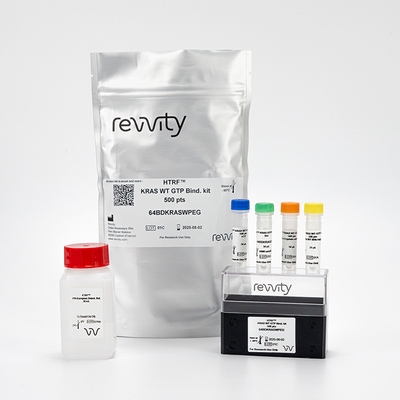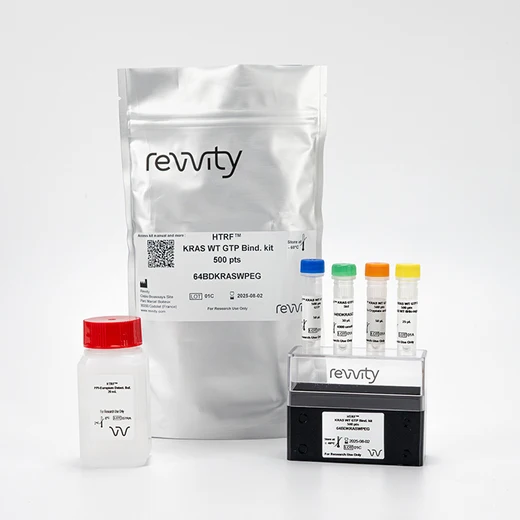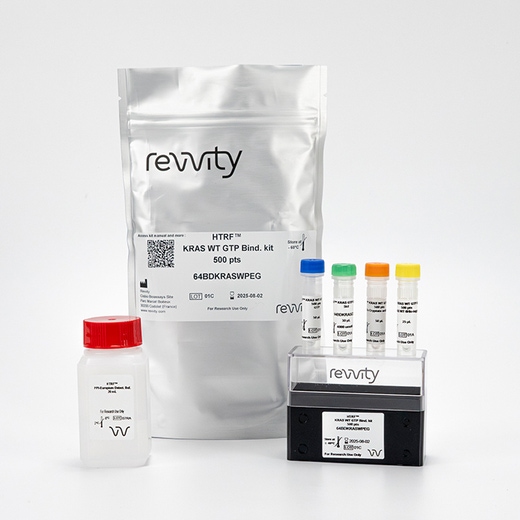

HTRF KRAS WT / GTP Binding Kit, 500 Assay Points


HTRF KRAS WT / GTP Binding Kit, 500 Assay Points






The KRAS WT GTP binding kit is designed to identify KRAS WT / GTP inhibitors.
| Feature | Specification |
|---|---|
| Application | Protein-Protein Interaction |
| Sample Volume | 2 µL |
The KRAS WT GTP binding kit is designed to identify KRAS WT / GTP inhibitors.



HTRF KRAS WT / GTP Binding Kit, 500 Assay Points



HTRF KRAS WT / GTP Binding Kit, 500 Assay Points



Product information
Overview
A fast and easy way to identify new KRAS WT / GTP competitors.KRAS is a small GTPase implicated in various biological processes, such as cell proliferation, cell survival, and cell metabolism. This proto-oncogene is well known to be mutated in many cancer subtypes, inducing an uncontrolled proliferation and cell metabolism modifications. It thereby contributes to the Warburg effect in cancer cells. Like the majority of small GTPases, KRAS binds to GDP in its inactive form or binds to GTP to switch to the active form. KRAS G12C is one of the most commonly present mutant forms in cancer which lead to a permanently active state of KRAS. Identifying new KRAS / GTP competitors is therefore a relevant strategy to control biological processes involved in cancer growth by reducing the KRAS activity, as well as the associated pathways.
Specifications
| Application |
Protein-Protein Interaction
|
|---|---|
| Brand |
HTRF
|
| Detection Modality |
HTRF
|
| Product Group |
Kit
|
| Sample Volume |
2 µL
|
| Shipping Conditions |
Shipped in Dry Ice
|
| Target Class |
Binding Assay
|
| Technology |
TR-FRET
|
| Therapeutic Area |
Oncology & Inflammation
|
| Unit Size |
500 Assay Points
|
Video gallery

HTRF KRAS WT / GTP Binding Kit, 500 Assay Points

HTRF KRAS WT / GTP Binding Kit, 500 Assay Points

How it works
Assay principle
The HTRF KRAS GTP binding assay is in a competitive assay format, using a GTP-Red reagent as KRAS WT ligand, a 6His tagged human KRAS WT protein, and an anti 6His Cryptate-labeled antibody. The compound being tested competes with the GTP Red reagent, and thereby prevents FRET from occurring.

Assay protocol
The Human KRAS WT binding assay can be run in a 96- or 384-well low volume white plate (20 µL final). As described here, samples or standards are dispensed directly into the assay plate. The human His-tagged KRAS WT protein is then added, followed by the dispensing of the HTRF reagents: The anti 6His antibody labeled with Europium cryptate and the GTP-Red reagent. The reagents labeled with HTRF fluorophores may be pre-mixed and added in a single dispensing step. No washing steps are needed. The protocol can be further miniaturized or upscaled by simply resizing each addition volume proportionally.

Assay details
|
GTP-Red reagent Kd |
70nM
|
|---|---|
|
GTP-Red reagent concentration |
50nM
|
|
KRAS GTP binding Standard (GDP) IC50 |
30nM
|
|
KRAS GTP binding Standard Ki
|
20.4nM
|
Assay validation
Screening of GTP competitors with human KRAS WT protein
Various nucleotides known to be GTP competitors were added to the assay. GDP (assay standard), GTPyS, and GTP displayed the right potency, in good correlation with the literature. ATP, a non-specific nucleotide, and BAY-293, a KRAS/SOS1 inhibitor, had no effect on the assay, confirming the specificity of the kit.


Resources
Are you looking for resources, click on the resource type to explore further.
Discover the versatility and precision of Homogeneous Time-Resolved Fluorescence (HTRF) technology. Our HTRF portfolio offers a...
This guide provides you an overview of HTRF applications in several therapeutic areas.
Get the latest insights on KRAS and see how it has switched from being an undruggable to a druggable cancer target.
In this white...
Screening for KRAS competitors and inhibitors with HTRF™ technology
KRAS is a proto-oncogene known to be mutated in many cancer...
Screening for KRAS competitors and inhibitors with HTRF™ technology
KRAS is a proto-oncogene known to be mutated in many cancer...


How can we help you?
We are here to answer your questions.






























